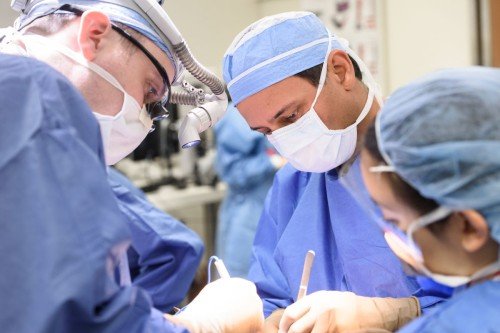Lip cancer is a type of head and neck cancer that begins when the cells that make up the lip grow out of control and form lesions or tumors. It is the most common cancer of the mouth.
Types of lip cancer
Lip squamous cell carcinoma: Lip cancer usually develops in the thin, flat cells called squamous cells that line the lips and other areas of the mouth. Lip cancer from squamous cells is called squamous cell carcinoma.
Melanoma on the lip: Melanoma is more aggressive than squamous cell carcinoma and can develop on your lips. Learn more about melanoma treatment.
Lip Cancer Symptoms
Common signs & symptoms of lip cancer include the following:
- a sore on your lip that does not heal.
- a lump on or thickness of your lips.
- bleeding, pain, or numbness on your lip.
Lip Cancer Risk Factors & Prevention
Lip cancer can affect anyone. The causes of most lip cancers and melanomas are linked to:
- smoking or chewing tobacco.
- drinking alcohol.
- being exposed to ultraviolet light, such as sunlight, for long periods of time.
Other factors that might raise your chances for getting lip cancer are:
- having light-colored skin.
- being male.
- having HPV (human papillomavirus), especially strains 16 and 18.
- being over 40 years old.
Many lip cancers are found during dental exams, so it’s important to see your dentist regularly. This is especially true if you have a higher risk for lip cancer.
How to prevent lip cancer
The best ways to prevent lip cancer are to limit how much alcohol you drink and try to quit or cut down on smoking and chewing tobacco. It’s also important to stay out of the sun (UV light) for long periods of time, including tanning beds.
Lip Cancer Treatment
The goals of lip cancer treatment, both melanoma and squamous cell carcinoma are to:
- cure the cancer.
- keep how your lips look and function.
- stop the cancer from coming back.
Surgery is the most common treatment for lip cancer. If the cancer is more advanced, radiation, chemotherapy, or both may be used to shrink the tumor before or after surgery to reduce the risk of the cancer coming back.
People who have surgery to remove large lip cancers may require cosmetic surgery, as well as help from experts trained in rehabilitation for speech, chewing, and swallowing.
Lip Cancer Surgery
For early-stage cancers, a surgeon removes the cancerous tissue and a very small area of healthy tissue surrounding the cancer (called a margin). After your tissue is removed, the skin is closed up with stitches (also called sutures). The sutures inside the mouth and on the lip will dissolve.
Micrographic surgery (also called Mohs’ surgery) can work well for lip cancer. This type of surgery involves removing the cancer in thin slices.
Your care team looks at each slice under a microscope before taking another slice. They stop when they find a slice that has no cancer cells under the microscope.
Looking at every slice means the doctor can remove the least possible amount of tissue. This surgery can help us keep the shape of your lips and lower the risk of speech problems.
Learn more about MSK’s surgery expertise.
Radiation Therapy for Lip Cancer
Radiation therapy for cancer of the lips involves aiming high-energy beams of particles at the tumor. When the particles reach the tumor, they can destroy cancer cells by damaging their DNA.
The radiation therapy team at MSK is highly experienced in caring for people with lip cancer. They work closely with other members of your care team and will customize a treatment plan based on your type of tumor. They factor in the size and shape of your tumor down to the millimeter, making a very specific plan. Their goal is to remove tumor cells but also to prevent the side effects of treatment by keeping the healthy cells in your mouth safe.
We’re available 24 hours a day, 7 days a week




